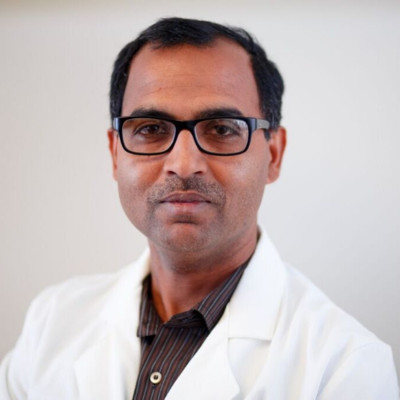Dr. Dash is a faculty member in the Meharry Medical College Center for AIDS Health Disparities Research (CAHDR) and the Department of Biochemistry, Cancer Biology, Pharmacology and Neuroscience. His research focuses on understanding the mechanisms of HIV-1 infection and probing the effects of drugs of abuse on HIV pathogenesis.

Batman or Superman?
Batman!
One tip for striking a good work-life balance.
Time Management.
When you were 5, what did you want to be when you grew up?
I had no clue!
How, when, and why did you decide to become a scientist?
This is a tough one. I have evolved as a scientist. Studying was a refuse for me in my childhood. The most vivid experience that shaped my scientific career is the day I saw DNA stained with ethidium bromide. I remember asking myself, if this molecule shapes our life, how cool it will be to play with DNA-the kingmaker molecule of life.
How long have you been at Meharry Medical College and what is your roll?
It has been almost 12 years since I joined Meharry as a Tenure-Track Assistant Professor with a K99/R00 career development award from the NIH. Currently, I am a Professor of Biochemistry and Cancer Biology in the Center for AIDS Health Disparities Research (CAHDR) at Meharry Medical College (MMC), Nashville, Tennessee. I am also an executive committee member of the Tennessee Center for AIDS Research (TN-CFAR), which is an NIH funded center for HIV/AIDS Research consisting of Meharry Medical College, Vanderbilt University Medical Center, Tennessee Department of Health and Nashville CARES. I also serve as the Chair of the Research Advisory Council at Meharry, to enhance research, innovation and development.
What aspect of your career do you enjoy the most, and why?
The most rewarding part of my career is to train the next generation of scientist. I realized quite early that there are very few scientists from the minority background. Since HIV/AIDS disproportionately impacts the minority community in the USA, addressing this critical public health problem needs leaders and scientists from various backgrounds.
What does your lab do/study?
My laboratory studies molecular and biochemical mechanisms driving HIV-1 infection. This virus is well known to cause AIDS that has killed more than 37 million people. Even though potent antiretroviral drugs are currently available and HIV infection has become a chronic disease, there is a continuous need for novel antiviral drugs to fight against drug resistant variants. Learning how the viral replication complexes function in an infected cell will be key to identify novel targets for therapeutic development.
2021 marks the 40th anniversary of the first AIDS case being reported. In your opinion, whathave been the most critical advancements and why?
Development of antiretroviral therapy is one of the most critical advances in the HIV/AIDS field. This has dramatically reduced HIV/AIDS related deaths and has made HIV infection a chronic disease. Because of this discovery, individuals carrying the virus can live an almost normal life.
June 5th is the day we honor all People with HIV. It is the anniversary of the day the U.S.Centers for Disease Control and Prevention reported in the Morbidity and Mortality WeeklyReport (June 5, 1981) about five cases of a rare pneumonia affecting young gay men living in California, and that two of the men died from their illnesses. It was the beginning of what would later be identified as HIV/AIDS. What piqued your interest in this field of research?
My interest in HIV/AIDS began with my PhD thesis research in the National Chemical Laboratory in Pune, India. My PIs lab largely focused on proteases from microbial source. However, I decided to study HIV-1 protease because of its unique biochemical properties and relevance to human health. This was also an enzyme that was easy to purify and set up an assay in a low-resource setting laboratory. Given the access to hundreds of microbes in the Departmental Biorepository, it was very cool to screen for an inhibitor of HIV-1 protease.
How do you foresee your research impacting human health?
The ongoing HIV/AIDS pandemic has claimed over 35 million lives . The only clinically approved treatment option for the around 38 million people globally living with HIV-1, including the around 1.2 million United States, are the anti-HIV drugs. However, these drugs must be taken life-long, this, in turn, leads to significant side effects and the development of drug-resistant mutant viral strains. Therefore, the continuous development of anti-HIV drugs is critical for our fight against HIV/AIDS. Our research focused on HIV-1 capsid protein (CA) is at the forefront of novel antivirals. In fact, several pharma companies are developing inhibitors targeting HIV-1 CA. Our attempt in our lab is to provide key knowledge about how this critical viral protein regulates HIV-1 infection. Learning these details to critically facilitate HIV-1 CA targeting antivirals.
June 27th was national HIV Testing Day, what is the research giving us to be excited about?
I am excited about several areas of research in HIV/AIDS. First, the novel anti-virals targeting HIV-1 CA. CA inhibitors are being tested as long-acting injectables. This has the potential to alleviate taking pills every day. Second, the use of new technologies such as CRISPR/Cas9 for functional HIV-1 cure. The ability of this tool to specifically target DNA sequences could be harnessed to excise integrated provirus. Third, the development of a HIV vaccine. There has been tremendous progress in the HIV-1 vaccine field. Most exciting is the development to mRNA technology to elicit immune response. I am very excited to see how this technology is used for developing a preventative HIV vaccine.
Have you had experiences that were important to shaping you as a scientist and mentor?
I have a number of experiences that has shaped my career as a scientist and a mentor. The most important one has been learning about the background and struggles of students. Being in Meharry offers an unique opportunity to learn about the life experiences and the motivation of students from various backgrounds. This experience has been very enriching to me both as a scientist and a mentor.
Is there a resource that has been valuable to you in your journey?
My colleagues, mentors and students have been the most important resource that has shaped my scientific journey.
Is there anything else you'd like to add?
Scientific research has transformed our lives. We need a renewed focus on identifying, training and promoting the next generation of scientists.
